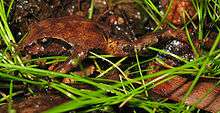Philoria
Philoria is a genus of frogs native to eastern and southern Australia.[1] These frogs are all confined to mountain areas, with 5 species occurring in the mountains of northern New South Wales and southern Queensland. One species occurs in Victoria. All species are listed as endangered, except the Baw Baw frog, which is listed as critically endangered.[2] They are small to medium-sized frogs that live in water saturated sites, such as sphagnum bogs and seepages on rocky slopes. The eggs are laid in foam nests hidden from light. The tadpoles remain within the nest and live entirely on the yolk.
| Philoria | |
|---|---|
 | |
| Sphagnum frog (Philoria sphagnicolus) | |
| Scientific classification | |
| Kingdom: | Animalia |
| Phylum: | Chordata |
| Class: | Amphibia |
| Order: | Anura |
| Family: | Limnodynastidae |
| Genus: | Philoria Spencer, 1901 |
| Diversity | |
| 6 species | |
| Philoria range. | |
Some taxonomists class only the Baw Baw frog (Philoria frosti) in the genus Philoria and class the other 5 species in the genus Kyarranus because of osteological features, size differences (Philoria frosti is larger) and the presence of a large gland behind each eye (parotoid gland).
Species
There are six species in the genus Philoria:[1]
| Common name | Binomial name |
|---|---|
| Baw Baw frog | Philoria frosti Spencer, 1901 |
| Mountain frog | Philoria kundagungan (Ingram & Corben, 1975) |
| Loveridge's frog | Philoria loveridgei Parker, 1940 |
| Southern mountain frog | Philoria pughi Knowles, Mahony, Armstrong & Donnellan, 2004 |
| Richmond Range mountain frog | Philoria richmondensis Knowles, Mahony, Armstrong & Donnellan, 2004 |
| Sphagnum frog | Philoria sphagnicolus (Moore, 1958) |
References
- Frost, Darrel R. (2013). "Philoria Spencer, 1901". Amphibian Species of the World 5.6, an Online Reference. American Museum of Natural History. Retrieved 18 December 2013.
- IUCN (2013). "IUCN Red List of Threatened Species. Version 2013.1. <www.iucnredlist.org>". Retrieved 18 December 2013.